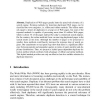238 search results - page 3 / 48 » Exploiting Hybrid Parallelism in Web Search Engines |
SIGIR
2010
ACM
13 years 9 months ago
2010
ACM
In this paper, we present a folksonomy-based approach for implicit user intent extraction during a Web search process. We present a number of result re-ranking techniques based on...
APWEB
2004
Springer
13 years 9 months ago
2004
Springer
Duplication of Web pages greatly hurts the perceived relevance of a search engine. Existing methods for detecting duplicated Web pages can be classified into two categories, i.e. o...
WEBDB
1999
Springer
13 years 9 months ago
1999
Springer
Many information resources on the web are relevant primarily to limited geographical communities. For instance, web sites containing information on restaurants, theaters, and apar...
CIKM
2010
Springer
13 years 4 months ago
2010
Springer
Ranking Web search results has long evolved beyond simple bag-of-words retrieval models. Modern search engines routinely employ machine learning ranking that relies on exogenous r...
ICWE
2010
Springer
13 years 4 months ago
2010
Springer
Inspired by the Google Wonder Wheel1 , in this paper we present Semantic Wonder Cloud (SWOC): a tool that helps users in knowledge exploration within the DBpedia dataset by adoptin...

